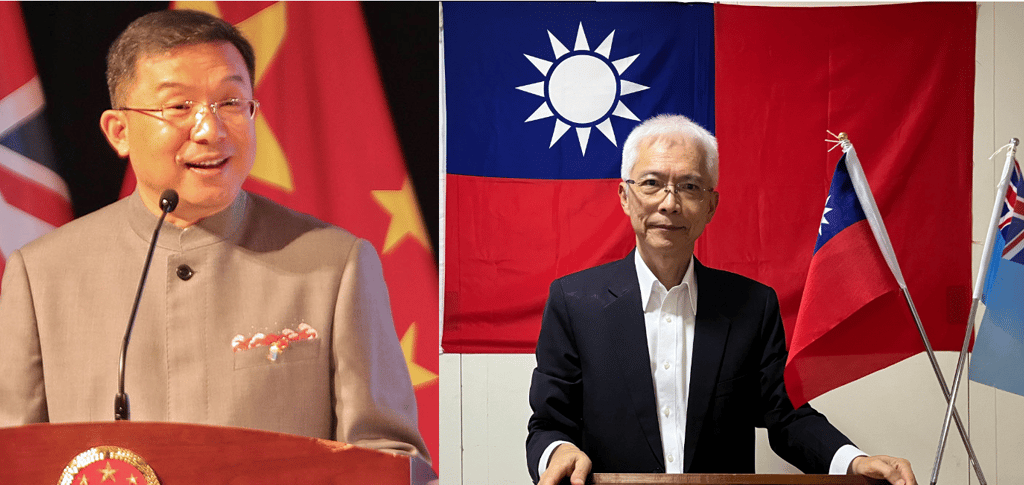Fiji: The Unlikely Battleground for China and Taiwan
FIJI NEWSWORLD


As tensions rise between China and Taiwan, with the South China Sea and the looming threat of war being discussed as potential triggers for World War III, an unexpected front has emerged in the Pacific.
Fiji, a small island nation in the South Pacific, has found itself at the centre of this geopolitical struggle, where the debate surrounding Taiwan's sovereignty is stirring significant discussions.
China's Ambassador to Fiji, Zhou Jian position has been very clear: Taiwan is not a country but a province of China. Taiwan, with a population of over 20 million, disagrees.
In Fiji, the Chinese mission exerts its trade influence as a leverage, actively stifling any official recognition of Taiwan. This diplomatic pressure is part of China's ongoing efforts to isolate Taiwan internationally, and in the Pacific region.
Ambassador Jian asserts that Taiwan is part of its territory, following the "One China" policy, which claims that there is only one China and Taiwan is an inseparable part of it. According to Ambassador Zhou Jian, Taiwan is not a separate country and should be under China's control.
However, Taiwan Ambassador Joseph Chow firmly disagrees with this claim. Ambassador Joseph Chow maintains that Taiwan is an independent country with its own government, constitution, military, elections, and borders.
"We operate as a fully functioning democracy, with our people overwhelmingly rejecting the idea of reunification with China. Polls consistently show that the majority of Taiwanese people want to continue living under their own system, with no interest in becoming part of China."
Ambassador Chow argues that the existence of a separate identity, a democratic political system, and the clear desire of its people to remain self-governed solidify Taiwan's stance as a sovereign state.
Ambassador Jian often points to UN General Assembly Resolution 2758 from 1971, claiming that it gives legal grounds for China's sovereignty over Taiwan.
But Ambassador Joseph Chow asserts that this interpretation is legally and factually flawed.
"Resolution 2758 only addressed the issue of who should represent China at the UN, recognising the People's Republic of China (PRC) as the legitimate representative of China and replacing the representatives of Chiang Kai-shek. Importantly, this resolution did not mention Taiwan or its sovereignty at all."
Ambassador Chow insists that Resolution 2758 should not be used as a basis for asserting sovereignty over Taiwan.
"The resolution only resolved the question of China's representation at the UN and did not make any determination about Taiwan’s status. Many countries that supported the resolution explicitly stated that their votes did not reflect a stance on Taiwan’s sovereignty."
Ambassador Chow argues that Ambassador Zhou Jian's insistence on using this resolution as a justification for its claim over Taiwan is a deliberate misinterpretation of the facts and has no legal standing under international law.
"Taiwan, or the Republic of China (ROC), has never been governed by the People's Republic of China. It has its own democratic government, military, and economy."
"Taiwan has its own currency, borders, and constitution, all of which are the key characteristics of a sovereign state under international law. Taiwan’s commitment to democracy, self-determination, and governance is undeniable. The principle of self-determination, recognised under international law, supports Taiwan's claim to sovereignty, as it has a government that represents its people’s will and a population that identifies as Taiwanese," said Ambassador Chow.
Taiwan’s position is also strengthened by its relationships with other countries. While some countries, under pressure from China, do not formally recognise Taiwan, Taiwan continues to engage in international trade, conduct diplomacy, and support humanitarian efforts globally. Taiwan's role in the Pacific region, providing aid to countries in need, is a testament to its ability to act independently on the world stage.
Below is a list of countries that recognise Taiwan as a sovereign nation:
Eswatini
Guatemala
Honduras
Marshall Islands
Nauru
Palau
Paraguay
Saint Kitts and Nevis
Saint Lucia
Saint Vincent and the Grenadines
Solomon Islands
Tuvalu